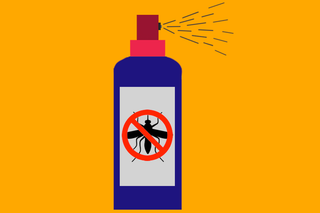
‘Natural’ Mosquito Repellents Not Necessarily Safe, Non‑Toxic
They contain compounds that should be used with caution.

From natural mosquito repellent wristbands and patches, to organic incense sticks to keep insects at bay — the market is brimming with chemical-free, non-toxic, ‘safe’ repellent options.
The alternatives to DEET (the most common active chemical used for making insect repellents) are natural products composed of essential oils derived from lemongrass, citronella, geranium or peppermint. Indian natural insect repellants may also contain Vetiver (Khus) or Neem (Indian Lilac). They are often advertised as alcohol-free; most of them are meant to be effective for three hours after application and safe for use by adults, children older than 1, and pregnant women.
However, a recent report by Joel Coats, a professor of Entomology at Iowa State University, calls some of these claims into question. Specifically, there are two problems with these “natural” insect repellents: they do not last as long as their synthetic counterparts, and second, they may not be as non-toxic as we think.
Coats’s lab, where scientists have been conducting research on natural products, such as catnip oil from the catmint plant and Osage orange (hedge apple), discovered that, “Virtually all of those natural repellents were too short-lived, providing protection from insects for little more than one or two hours.”
His team has also tested more than 300 different natural oils such as citronellol, menthol, and thymol, and though they were successfully tested against mosquitoes and could be termed ‘biorational’ (products derived from natural resources), the lab couldn’t conclude if they are truly non-toxic.
According to a 2011 review on efficacy of natural products by the US-based National Center for Biotechnology Information (NCBI), it would be wrong to assume that plant-based repellents are safer than DEET, or that a substance being natural necessarily equates to it being safe.
The review said that while lemon eucalyptus was thought to pose no risk to human health, it did not, and still does not, have EPA or Environmental Protection Agency registration for use as an insect repellent. Citronella, on the other hand, showed reductions in biting by around 50%, but wasn’t as effective as its DEET-based products. The EPA has also not approved Neem for use as an insect repellent and is said to cause skin irritation such as dermatitis if used undiluted.
“DEET’s toxicology has been more closely scrutinized than any other repellent, and it has been deemed safe for human use, including use on children, pregnant women, and lactating women,” said the NCBI review.
It added that in contrast, plant-based repellents do not have this rigorously tested safety record, with most being deemed safe because they have simply been used for a long time. The study warns that many plant-based repellents contain compounds that should be used with caution.
Also, the assumption that plant-based mosquito repellents are better for the environment than synthetic molecules may not entirely be true. Plant volatiles may be naturally derived, but their distillation requires biomass energy; further, extraction commonly uses organic solvents that must be disposed of carefully, and growing them requires agrichemicals such as fertilizers and pesticides (unless sourced from a sustainable and organic source).
Hence, until further studies and research prove that natural repellents are entirely effective or are better than DEET-based products for humans and the environment, it would be wrong to assume that it’s necessarily safer to pick them over their synthetic alternatives.
Anubhuti Matta is an associate editor with The Swaddle. When not at work, she's busy pursuing kathak, reading books on and by women in the Middle East or making dresses out of Indian prints.
Related


40% of Women Who Commit Suicide Globally Are Indian. Most of Them Are Married.
